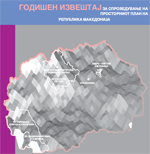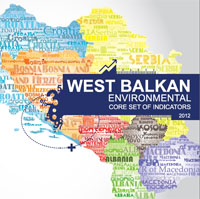The MOEPP in cooperation with UNEP is working on the implementation of the objectives of the Green Deal for the Western Balkans in the area of climate change. The Minister of Environment and Physical Planning, Kaja Shukova, today opened the introductory workshop for the project “Climate Proofing for Sustainable Development in the Western Balkans”, whose goal is to establish a comprehensive information base adapted to the needs of the Republic of North Macedonia and the Western Balkans.
 – I am satisfied that the Republic of North Macedonia as a candidate country for membership in the European Union and as a contracting party of the energy community is part of the efforts to deal with the global warming and is committed to working towards the goal of climate neutrality by 2050 – the heart of the European Green Deal, like the rest of the EU countries within the Energy Community – Minister Shukova pointed out in her opening speech.
– I am satisfied that the Republic of North Macedonia as a candidate country for membership in the European Union and as a contracting party of the energy community is part of the efforts to deal with the global warming and is committed to working towards the goal of climate neutrality by 2050 – the heart of the European Green Deal, like the rest of the EU countries within the Energy Community – Minister Shukova pointed out in her opening speech.
 According to her, although our country has already taken part important commitments for mitigation, especially in strengthening nationally determined contributions, it is necessary to do much more in terms of growing resistance to climate change.
According to her, although our country has already taken part important commitments for mitigation, especially in strengthening nationally determined contributions, it is necessary to do much more in terms of growing resistance to climate change.
 – That is why I will continue to call on sectors and companies to redouble their efforts, to ensure that their emission targets represent the highest possible ambition and to implement the commitments they have undertaken – said Shukova.
– That is why I will continue to call on sectors and companies to redouble their efforts, to ensure that their emission targets represent the highest possible ambition and to implement the commitments they have undertaken – said Shukova.
The project will last 4 years, is financed by the Austrian Development Agency, and will be implemented with the support of the UN Environment Program (UNEP), Office in Vienna.
 Apart from the establishment of a comprehensive information base, the project will also promote activities for training and development of climate change capacities, as well as local piloting in selected tourist destinations, given that the tourism sector is one of the most vulnerable to climate change, so accordingly the investments in this economic sector should be climate resistant. The project builds on the findings of the Clima proof project, to increase the climate and socio-economic resilience of the countries of the Western Balkans, taking into account the projected climate impacts for that region.
Apart from the establishment of a comprehensive information base, the project will also promote activities for training and development of climate change capacities, as well as local piloting in selected tourist destinations, given that the tourism sector is one of the most vulnerable to climate change, so accordingly the investments in this economic sector should be climate resistant. The project builds on the findings of the Clima proof project, to increase the climate and socio-economic resilience of the countries of the Western Balkans, taking into account the projected climate impacts for that region.





































































